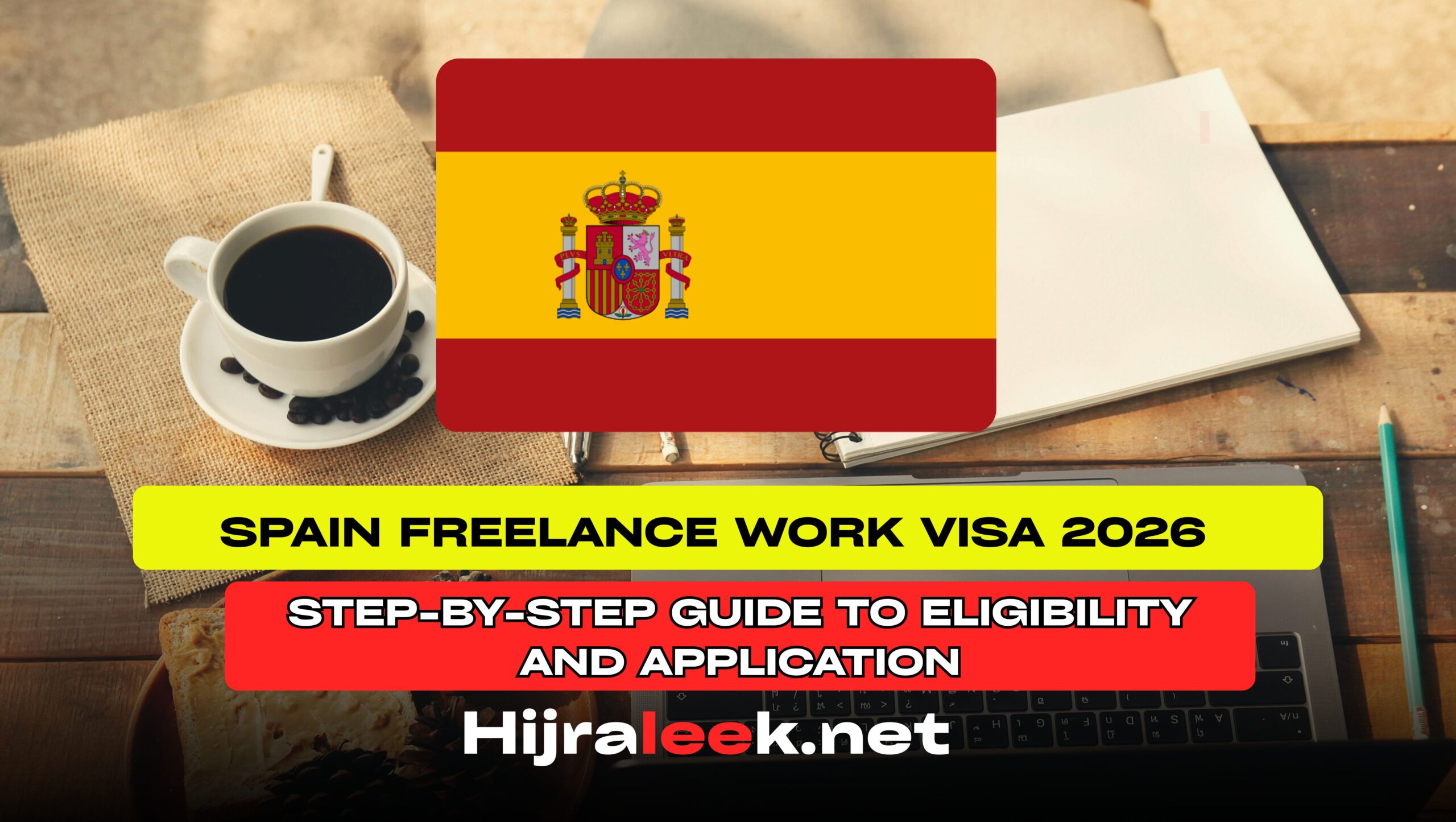The Spain Freelance Work Visa 2026, officially known as the Digital Nomad Visa or Self-Employed (Autónomo) Visa, allows non-EU freelancers, remote workers, and self-employed professionals to live and work in Spain for up to 1 year (renewable up to 5 years), with a pathway to permanent residency. Introduced in 2023 under the Startup Act, this visa targets digital nomads earning at least €2,646/month (200% of minimum wage in 2025, adjusted annually). In 2026, Spain anticipates processing over 10,000 applications amid a booming remote work trend, with simplified requirements for tech, creative, and consulting professionals. This step-by-step guide covers eligibility, documents, application process, costs, benefits, challenges, and FAQs, helping you secure your visa. Platforms like Hijraleek connect freelancers with Spanish clients and co-working spaces to meet income thresholds.
Overview of the Spain Freelance Work Visa
Spain’s Freelance Visa is designed for non-EU nationals working remotely for foreign clients (at least 80% of income from outside Spain) or starting self-employed ventures. It grants a 1-year initial stay, renewable for 2-year periods, and allows family reunification. Unlike traditional work visas, it doesn’t require a local employer but demands proof of stable income and professional qualifications. In 2026, updates may include faster processing (15–30 days) and extended remote work allowances, aligning with EU digital nomad strategies. The visa is issued as a Type D long-stay visa, leading to a TIE (Tarjeta de Identidad de Extranjero) residence card upon arrival.
Why Apply for the Spain Freelance Visa in 2026?
Spain’s appeal lies in its Mediterranean lifestyle, high-speed internet (average 300 Mbps), and tax incentives like the Beckham Law (24% flat tax for new residents). With over 500,000 digital nomads in Europe, Spain ranks top for freelancers due to co-working hubs in Barcelona and Madrid. The visa offers Schengen mobility, healthcare access, and a path to citizenship after 10 years. In 2026, economic recovery and EU funding for remote work (€1 billion Green Digital Deal) will boost opportunities in tech freelancing and creative industries.
Who is Eligible for the Spain Freelance Work Visa?
Eligibility focuses on financial stability and professional legitimacy. Key requirements:
- Nationality: Non-EU/EEA/Swiss citizens (e.g., US, UK, India, Brazil).
- Age: No minimum/maximum, but must be legally competent to work.
- Income: €2,646/month (200% of IPREM €1,323/month in 2025; expect slight increase in 2026). Proof via bank statements or client contracts (80% foreign-sourced).
- Professional Experience: At least 3 years in your field or relevant degree; must work remotely for non-Spanish clients.
- Health and Character: Clean criminal record; private health insurance (€30,000 coverage).
- Other: No prior EU residency; intent to reside in Spain (not just visit).
Family members (spouse, children under 18) can join if you prove €1,323/month per dependent.
Documents Required for the Application
Prepare originals and copies; non-Spanish documents need certified translations and apostilles.
Core Documents
- Application Form: EX-01 (long-stay visa) and EX-07 (self-employment authorization), available on exteriores.gob.es.
- Passport: Valid 6+ months beyond stay, 2 blank pages; copy of photo page.
- Photos: 2 recent passport-sized (3×4 cm, white background).
- Proof of Income: 3 months’ bank statements, client contracts, or tax returns showing €2,646+/month.
- Professional Qualifications: Degree/diploma, CV, and 3+ years’ experience certificates.
Additional Documents
- Health Insurance: Private policy (€30,000 coverage, valid in Spain).
- Criminal Record: Apostilled certificate from home country (valid 3 months).
- Business Plan: For self-employed; outline services, market analysis, and financial projections.
- Accommodation Proof: Rental contract or hotel booking for first month.
- Medical Certificate: From approved doctor confirming good health.
For family: Marriage/birth certificates, dependency proof.
Step-by-Step Application Process
The process takes 15–60 days; start 3 months before your planned move. Applications are submitted at Spanish consulates/embassies or VFS Global centers.
Step 1: Assess Eligibility and Prepare
- Verify income (€2,646/month) and experience (3 years).
- Draft business plan (10–20 pages) if self-employed.
- Gather apostilled documents; translate via sworn translators (€50–€150).
Step 2: Book Appointment and Submit Application
- Schedule via blsspainvisa.com or embassy website (e.g., exteriores.gob.es for US applicants).
- Submit in person: Form EX-01, documents, and €80–€100 fee (visa + fingerprinting).
- Include motivation letter explaining why Spain and your freelance viability.
Step 3: Attend Biometrics and Interview
- Provide fingerprints/photos at appointment (15–30 minutes).
- Interview (if required): Discuss business plan, income sources, and ties to home country (to prove non-immigrant intent).
Step 4: Await Decision and Collect Visa
- Track status via email/SMS (15–60 days; priority for complete apps).
- If approved, collect Type D visa sticker (valid 90 days for entry).
- Enter Spain; apply for TIE at local Foreigners’ Office (Oficina de Extranjería) within 30 days (€12–€20 fee).
Step 5: Post-Arrival Steps
- Register at town hall (Padrón) for NIE (foreigner ID).
- Obtain social security number (NIF) for taxes/freelance registration (Alta en Autónomo, €60/month flat rate first year).
- Renew annually; after 5 years, apply for long-term residency.
For 2026, expect digital submissions via the new e-Visa platform for faster processing.
Costs of Applying for the Spain Freelance Work Visa 2026
Government Fees
- Visa Fee: €80 (Type D) + €15 fingerprinting.
- TIE Fee: €12–€20.
- Self-Employment Registration: €60/month (flat rate first year; full contributions after).
Other Expenses
- Translations/Apostilles: €100–€300.
- Health Insurance: €500–€1,000/year.
- Medical Exam: €50–€100.
- Travel: Flights €200–€800; initial accommodation €500–€1,000/month.
Total: €1,000–€2,500; income proof covers ongoing costs.
Salary and Benefits for Freelancers in Spain 2026
Average Freelance Income
- Minimum Required: €2,646/month (pre-tax).
- Typical Earnings: €3,000–€5,000/month for digital nomads (e.g., web devs, consultants); €2,000–€3,500 for creative freelancers.
- Tax Rate: 24% flat under Beckham Law for new residents (vs. 19–47% progressive).
Benefits
- Residency Rights: Schengen travel (90/180 days).
- Healthcare: Access to public system after registration (€60/month contribution).
- Family Inclusion: Dependents get visas; child education free.
- Path to PR: 5 years leads to permanent residency; 10 years for citizenship.
Challenges and Tips for Success
Common Challenges
- Income Proof: Strict €2,646/month verification; fluctuating freelance income risky.
- Processing Delays: Up to 60 days; incomplete apps rejected.
- Business Plan Scrutiny: Weak plans denied; must show viability.
Tips for Approval
- Strong Business Plan: Include market research, client list, projections (€50,000+ annual revenue).
- Apply Early: January–March 2026 for summer start; use exteriores.gob.es for updates.
- Use Platforms: Hijraleek for client connections to meet income threshold.
- Legal Help: Consult immigration lawyers (€500–€1,000) for complex cases.
Frequently Asked Questions (FAQs)
1. What is the Spain Freelance Work Visa?
It’s a 1-year renewable visa for non-EU freelancers/remote workers earning €2,646+/month from foreign clients.
2. How long does the application take?
15–60 days; apply 3 months before travel.
3. Can I include family?
Yes, spouse/children under 18 with dependency proof and extra income (€1,323/month per dependent).
4. What’s the minimum income for 2026?
€2,646/month (200% IPREM; expect adjustment to €2,700–€2,800).
5. Do I need a local client?
No—at least 80% income from abroad.
6. How to renew the visa?
Prove continued income and compliance; apply 60 days before expiry.
7. Is health insurance mandatory?
Yes; private policy (€30,000 coverage) until public access.
8. Can I switch to PR after 5 years?
Yes; renewable for 2-year periods, leading to long-term residency.
9. What if my application is rejected?
Appeal within 1 month or reapply with stronger docs (e.g., more income proof).
10. Where to apply from the US/UK?
At Spanish consulates (e.g., Washington DC, London); book via BLS International.
Conclusion
The Spain Freelance Work Visa 2026 empowers digital nomads to thrive in a sun-soaked, culture-rich environment while building a sustainable career. With straightforward eligibility and a clear path to residency, it’s a smart move for freelancers eyeing Europe. Start by verifying your income and drafting a solid business plan—use Hijraleek for client leads and exteriores.gob.es for forms. Your Spanish adventure awaits!




















